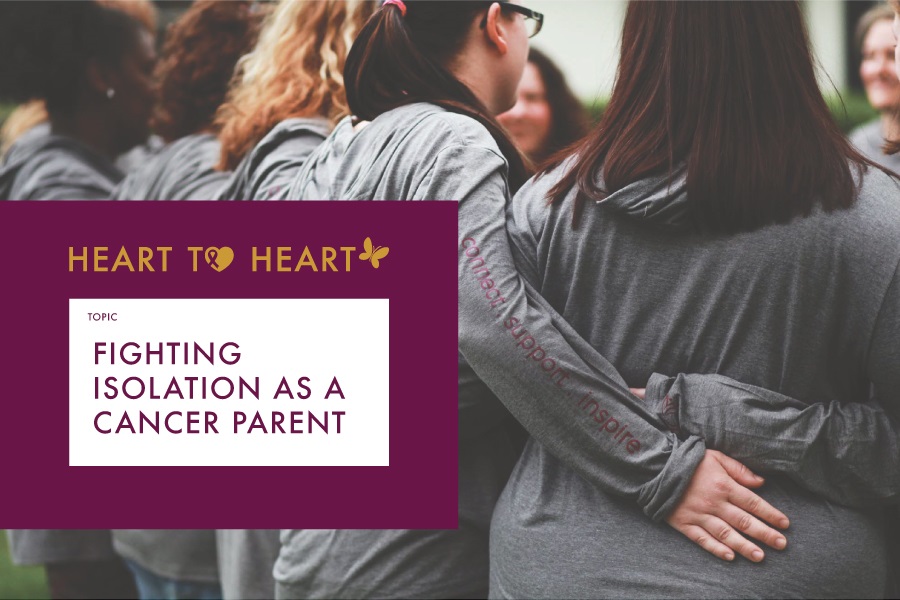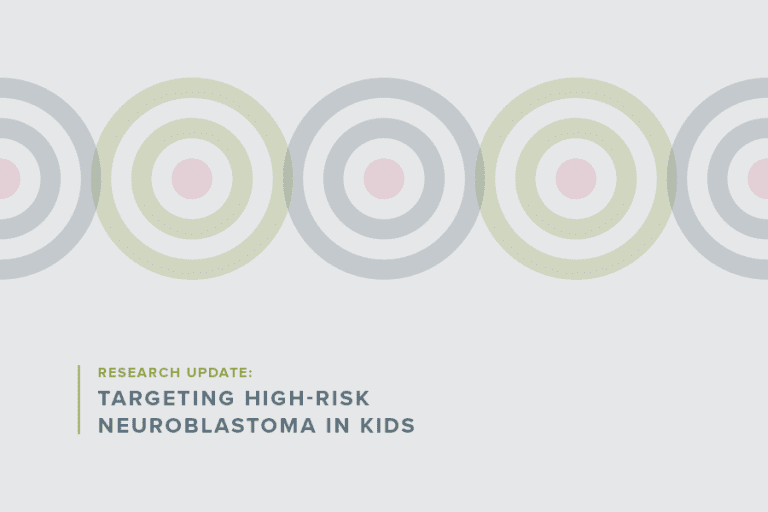Isolation – it’s one of the many painful challenges cancer families experience during and after treatment. Many parents feel they can’t leave their child’s side, and they feel guilty if they leave the hospital or the house to do things their child can’t. On top of it all, it can often feel like nobody else you know understands what your family is going through. But there are ways to break out of the cycle of isolation that cancer creates. Through our partnership with Momcology, we asked cancer caregivers how they’ve experienced isolation during treatment. Here are their responses, and a few suggestions on how to cope through times of isolation and loneliness.
Accepting Help – Tough, But Necessary
Staying in a tiny hospital room for days or weeks on end can be incredibly isolating. Getting out, whether it’s just walking down the hall or walking outside, is important for your mental health. Don’t be afraid to ask someone to stay with your child for a few hours while you get out and refresh yourself, or set up a coffee date with a friend so you’re out of the “cancer world” for a while. In doing so, you give the people who love you an opportunity to do their part for your child, and your child might not mind a break from you. It’s not easy to ask for help, but you’ll be a better caregiver if you allow yourself opportunities for self-care.
“In the hospital I really just stayed in the room or walked around on my own. But at home, I have started to accept a neighbor’s offer of a walk or a coffee at her place. Though she doesn’t understand at all, I realize people, if given the chance, are willing to listen. A year ago, I wouldn’t have understood either. I decided to give people a chance to help. Some days I need to think about something other than cancer for just 10 minutes. I used to feel guilty about that, but it has helped me be a better mom for both my kids.” - Vanya
“I struggled with not wanting to burden my family or friends, so I kept a lot of my struggles to myself. Especially when my husband was deployed, my mom and I had some hard times because she wanted to be there for me and take care of me, but I often shut it out. Looking back, I wish I wouldn’t have isolated myself so much from the help some others were trying to offer.” – Alli
“I isolated myself also. Looking back, I wish I would have asked my family for more help. My mom wanted to go with me to sit with my daughter at the hospital, but I took it all on myself.” – Natalie
Hospital Staff are Lifesavers – In More Ways Than One
Pediatric oncology nurses and hospital staff have seen it all. Even if they haven’t had a child with cancer, they may be the closest thing to an understanding peer you have while you’re in the hospital. You may never have thought that this place, with its beeping machines and harsh hospital lighting would become your new community – but it is. Nurses and other staff members can be just the listening ear you need and provide a social connection you may never have guessed you’d find in a hospital.
“We had a night nurse at our local hospital who has a granddaughter who is a cancer survivor. She was the best. When we would be inpatient and she saw us there, she made it a point to be our nurse. I can’t tell you how many times I cried on her shoulder while my daughter slept.” – Natalie
“Nurses who get it are GOLD and they give amazing advice. I remember one who ordered me a tray of food because she knew I hadn’t slept or eaten in a very long time. I literally started crying at the sight of food for me and that someone “saw” me. It was love in action.” – Mindy
“Nurses were a huge support. The hope they could offer, the insight they had and the suggestions they have are incredible. In the PICU when I was blindsided the morning I found out my daughter had cancer, the nurse who was there sat with me for over an hour while I cried so I didn’t have to be alone with that heavy news. He was a godsend.” - Jennifer
Make an Effort – Even if it Feels Hard or Awkward
Having a child with cancer is all about doing whatever you can with whatever you have. If you’re stuck in the hospital, try to chat with nurses and other parents. Look for a support group in the hospital you can join or just strike up conversation in common areas. If you’re at home, talk with your doctors about what your child can do when they are feeling up to it, and take advantage of those opportunities. Nothing in life is easy anymore – and that includes making social connections with others. But the effort you put in to form those connections will make it less scary to do it again when you need it most.
“I felt so isolated during my son’s treatment. We didn’t have any extended family nearby and my husband traveled a lot for work. I made a promise to myself to make a new connection each time my son was admitted. I eventually made some of my closest friends that way who became my support system during my hardest days.” – Kim
“I’ve met other parents on the oncology floor. Some of the local parents I’ve met through Momcology have a Facebook page and we post when we will be inpatient or have appointments. Sometimes we meet up for coffee or to bring snacks and things to keep each other busy.” – Andrea
“I would talk to my son’s doctors about what he was allowed to do when his numbers were stable, and they were all very supportive of going out and doing things within reason, which was very helpful for us, because he was still an active two year old at the time.” - Alli
It's Ok to Want Some Distance
As much as you may be feeling isolated at times during your child’s treatment, it’s also okay to not want to connect with people sometimes, especially if those people frustrate or exhaust you. You can control how much or how often you interact with others by communicating through Facebook or CaringBridge – seeing the love others offer through these platforms can help you feel supported at times when you just aren’t up for phone calls, coffee dates or visitors. Being lonely is different from being alone – take a moment to slow down and identify which one you’re feeling so you can address the feeling in a way that works best for you.
“I still find it difficult at times to be as social as I was before diagnosis. I have a very hard time listening to people complain about miniscule issues… I have to remind myself that they are basing their opinions around their own experiences and I need to be empathetic to those experiences… even if they seem ridiculous.” – Tina
“I think physical isolation from most of my pre-cancer friends kept me from shattering into a thousand tiny pieces. It was almost a necessity. I felt that if I took my eye off the ‘cancer world’ and looked back somehow my child might slip away into the crack between worlds. Trying to reconnect and strengthen those connections with my ‘pre-cancer’ friends… I am not the person I was. It’s not an easy thing.” – Cathy
“CaringBridge was my saving grace. I could write about our day and keep everyone updated without numerous phone calls. I felt connected to all those reading my journaling and those on similar journeys.” - Jill
Replacing Isolation with Community – Sharing a Common Bond
Reaching out and making connections with other parents and families who are also going through a childhood cancer diagnosis can not only help with isolation, but can also be healing for many parents. Connecting and communicating with others can bring a sense of comradery and purpose that we would not otherwise experience while caring for a child with cancer. The support felt by someone who can truly relate to everyday struggles and victories is invaluable. Being able to share common thoughts, feelings and stories can quickly alleviate stress and isolation. Many parents find it is easier to open up to someone who has walked a similar path and can help them with the challenges ahead through their own experiences.
“It was the connections I made with other cancer moms - mostly online, but sometimes in the halls of the hospital, or at a weekly clinic facilitated support group that saved me. Tethered me to myself and held my hand through the worst and darkest days. Those mommas still take up a huge place in my heart." - Cathy
“Being involved in both Momcology and childhood cancer advocacy/fundraising after losing my son has been an absolute lifesaver in fighting isolation and finding purpose. I’m a huge peer support fan — even having social media friends/fellow moms who understand is huge.” - Julie
About Momcology
Momcology, in partnership with Children’s Cancer Research Fund, is working to create meaningful content that raises awareness about what families face while going through childhood cancer. By combining CCRF’s authentic storytelling capabilities with the many voices and experiences from within the Momcology network, we are eager to provide a new platform to amplify caregivers’ voices to the public to both accelerate research and raise awareness. Visit Momcology to learn more and join their community.
Sharing Your Story is Powerful
Your story of childhood cancer is powerful – it can raise awareness for what is needed in the world of childhood cancer research and even encouraging fundraising for vital research projects. See how your story can make an impact by filling out our Share Your Story form.



